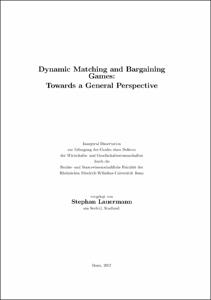Dynamic Matching and Bargaining GamesTowards a General Perspective

Dynamic Matching and Bargaining Games
Towards a General Perspective

| dc.contributor.advisor | Nöldeke, Georg | |
| dc.contributor.author | Lauermann, Stephan | |
| dc.date.accessioned | 2020-04-09T10:53:30Z | |
| dc.date.available | 2020-04-09T10:53:30Z | |
| dc.date.issued | 2007 | |
| dc.identifier.uri | https://hdl.handle.net/20.500.11811/2773 | |
| dc.description.abstract | "Nature makes no jumps," according to a famous saying - but what about economies? Is economic welfare continuous in the size of the frictions of trading and do the welfare theorems hold approximately when frictions are small? We will look at a specific institution - a decentralized market - and at a specific problem in decentralized markets that might be induced by frictions - market power. We will ask: When frictions in the decentralized market are small, will the trading outcome be approximately efficient? Suppose you are looking for a job that pays a good wage. Most likely, you will have to exert effort to find some vacancies - these are the frictions of trade. Once you have found some vacancies, you will have to bargain with each single employer separately - this is the decentralized nature of the market: Despite the fact that there are potentially hundreds of other employers and workers in the market, within each negotiation, you will find yourself in a bilateral, one-on-one relationship. In this relationship, each of you might enjoy some market power and the outside option of searching for a new partner is of limited help since search is costly. In addition, both of you might not know how important a deal is to the other, and both of you are probably low-balling: The employer offers only low wages (since, unfortunately, he can hardly afford a new employee), while you ask for a high wage (since, actually, you do not really need the job right now). Is there reason to believe that a labor market can nevertheless be well approximated by a general equilibrium model, which assumes that wages will be market clearing and which predicts that the trading outcome is efficient? Situations as described before can be modeled as dynamic matching and bargaining games, which have been introduced by Gale (1987). Formally, we will look at the limit of the equilibrium outcomes of such setups when δ converges to zero. The first chapter of this thesis illustrates how market power in the bilateral bargaining situation can make the overall trading outcome inefficient. We show that if sellers can observe the valuation of the buyers, i.e., if information is symmetric, and if sellers make price offers, then the overall surplus is increasing in the size of frictions δ. In particular, the outcome does not become efficient when d converges to zero. The second chapter shows that the outcome does become efficient if sellers can not observe the valuation of the buyers, i.e., contrary to intuition, asymmetric information makes trading more efficient. We relate the positive convergence result in this second chapter to the informal reasoning that prices must be market clearing (implying an efficient trading outcome) since otherwise sellers would be rationed, giving them an incentive to offer lower prices. The third and final chapter of this thesis explores the general structure of the first two results. We observe that each specification of a dynamic matching and bargaining game together with a decreasing sequence of frictions defines a sequence of trading outcomes. We will discuss structural properties of such sequences, which on the one hand ensure that its limit is efficient, while relating on the other hand to economic properties of the underlying games. Thereby, we highlight a common cause behind existing positive convergence results, e.g., those by Gale (1987) and Satterthwaite and Shneyerov (2007). We also illustrate the structural properties of some other specifications for which trading outcomes fail to converge to efficiency, e.g., Serrano (2002) and DeFraja and Sakovics (2001). Although we will concentrate on the characterization of trading outcomes in the limit, it should not go unnoticed that the first two chapters provide characterizations of trading outcomes for every level of frictions. The first main result is that asymmetric information, i.e., consumer privacy, can be good for e¢ ciency in a market: In contrast to bilateral interaction, in a market the distribution of rents between the trading partner matters, and this distribution of rents is influenced by the degree of information. The second main result is the provision of a generalized Lerner formula for dynamic markets in which buyers can time their purchases. We show that the markup of prices over costs is proportional to the dynamic elasticity of demand. Nevo and Hendel (2006) empirically analyse the market for laundry detergents and show that the possibility to store these goods makes demand more elastic. Both results of these chapters are of direct relevance for economic policy evaluation. | en |
| dc.language.iso | eng | |
| dc.rights | In Copyright | |
| dc.rights.uri | http://rightsstatements.org/vocab/InC/1.0/ | |
| dc.subject | Dezentrale Märkte | |
| dc.subject | Dynamic Matching and Bargaining | |
| dc.subject | Decentralized Market | |
| dc.subject.ddc | 330 Wirtschaft | |
| dc.title | Dynamic Matching and Bargaining Games | |
| dc.title.alternative | Towards a General Perspective | |
| dc.type | Dissertation oder Habilitation | |
| dc.publisher.name | Universitäts- und Landesbibliothek Bonn | |
| dc.publisher.location | Bonn | |
| dc.rights.accessRights | openAccess | |
| dc.identifier.urn | https://nbn-resolving.org/urn:nbn:de:hbz:5-10687 | |
| ulbbn.pubtype | Erstveröffentlichung | |
| ulbbnediss.affiliation.name | Rheinische Friedrich-Wilhelms-Universität Bonn | |
| ulbbnediss.affiliation.location | Bonn | |
| ulbbnediss.thesis.level | Dissertation | |
| ulbbnediss.dissID | 1068 | |
| ulbbnediss.date.accepted | 15.06.2007 | |
| ulbbnediss.fakultaet | Rechts- und Staatswissenschaftliche Fakultät | |
| dc.contributor.coReferee | Moldovanu, Benny |
Dateien zu dieser Ressource
Das Dokument erscheint in:
-
E-Dissertationen (289)




